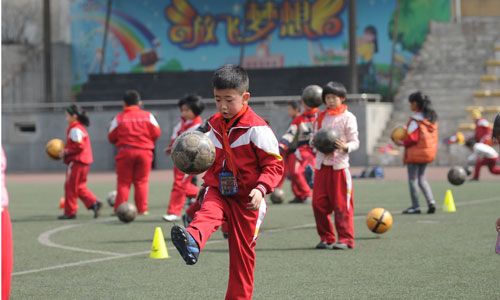China eyes World Cup with ambitious soccer overhaul
Sports professionals to run CFA, cut red tape

A Chinese boy practices soccer during a training session at Dicun Primary School in Taiyuan, North China's Shanxi Province, on Monday. Photo: IC
China announced Monday an ambitious plan to overhaul the nation's soccer management hoping to achieve World Cup recognition, a move observers believe will boost China's soft power.
The 50-point plan passed last month by China's leading group of central reform, chaired by President Xi Jinping, outlines a reform that will involve almost every aspect of the sport, including the management system, professional clubs, professional leagues, national teams and grass-roots soccer players.
One of the most significant measures is separating the Chinese Football Association (CFA) from the government sports regulator, the General Administration for Sport, with the power to independently determine its manpower and financial requirements.
The association will carry no administrative rank, and will be made up of professional soccer players and representatives from the sports authorities under the State Council to ensure the body's professionalism.
"Revitalizing soccer is a must to build China into a sports powerhouse as part of the Chinese dream. It is also what the people desire," said the central reform leading group.
The "Chinese dream," put forth by President Xi, is to build a moderately prosperous society and realize national rejuvenation.
Wang Dazhao, a Beijing-based sports commentator, told the Global Times that the importance of soccer development transcends the playing fields and may serve as the impetus for other social and economic reforms in China.
"Soccer, as the world's most popular sport, can drive huge economic growth and mass social participation in China. Its development will also boost the country's cultural soft power," Wang said.
With hosting and qualifying for the World Cup finals listed as long-term goals, authorities plan to substantially increase the number of young people playing soccer with the number of special "soccer schools" raised to 20,000 after five years and 50,000 in 10 years.
China currently has 5,000 such schools, according to the plan.
Wang believes the move may signal the beginning of an overall reform of China's sport management that will reduce administrative interference and allow more room for the sector's professional development.
"There has been heavy government intervention in the sector and professionals have little say in development. The new plan will allow professionals to build a system consistent with soccer development," noted Wang.
Cao Lei, deputy general manager of the League One's (second tier) club Harbin Yiteng Football, told the Global Times that the reform will benefit their club in the long run.
"As soccer gains popularity among teenagers, there will be a greater pool of players to choose from," Cao said.
A national lottery for the Chinese football leagues will also be established, with revenue going toward the sport's development.
The plan also aims to see the women's team return to the top while improving the quality of the men's team.
Despite being an Olympic powerhouse with athletes winning numerous medals at the Games, China still struggles in the world's soccer rankings.
China's men's team, currently ranked 83rd by the International Football Federation (FIFA), has qualified for the World Cup only once in 2002.
Meanwhile, the women's team is struggling to recreate their glory as the 1999 World Cup runners-up.
The stalled development of Chinese soccer is often blamed on a history of corruption, bureaucratic red tape and a weak youth training system.
Wang said the lack of regulation and supervision of the soccer management authority have given rise to corruption in the sector, which in the long term would hurt the sport's reputation and the public's confidence in China's soccer program.
He has likewise also proposed legislation to define the role and responsibilities of the CFA to prevent abuses of power.
"The management of the CFA is constantly reshuffled, hence preventing a consistent and long-term policy. The absence of soccer professionals in management has also given rise to unreasonable policies that are inconsistent with the needs of soccer development," Ma Dexing, deputy editor of the Changsha-based Titan Sports, told the Global Times.
The move came after the central government announced Wednesday the introduction of soccer textbooks in the school curriculum of more than 5,000 elementary and secondary schools across the nation, and to add at least one compulsory soccer class to students' school schedule every week.
Lu Wenao contributed to this story